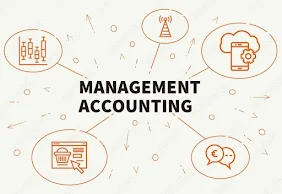Management accounting is a vital aspect of a company's internal operations, focusing on providing relevant financial information to aid managerial decision-making. Unlike financial accounting, which primarily deals with reporting to external stakeholders such as investors and regulatory bodies, management accounting is tailored to meet the needs of managers within the organization. Its primary objective is to assist in planning, controlling, and decision-making processes.
One of the key functions of management accounting is to help managers plan for the future. This involves forecasting and budgeting, where historical data and various assumptions are used to predict future financial outcomes. By creating detailed budgets and forecasts, managers can set targets, allocate resources efficiently, and establish benchmarks for performance evaluation.
Management accounting serves as a crucial tool for managers to plan, control, and make informed decisions within an organization. By providing timely and relevant financial information, management accountants enable managers to navigate complex business environments, optimize resource allocation, and drive sustainable growth.
Here are definitions of Management Accounting by various authors:
1) Anthony and Govindarajan (2007): "Management accounting is concerned with providing information to managers— that is, to those who are inside an organization and who direct and control its operations. Management accounting can be contrasted with financial accounting, which is concerned with providing information to stockholders, creditors, and others who are outside an organization."
2) Drury (2018): "Management accounting is the process of identification, measurement, accumulation, analysis, preparation, interpretation, and communication of information that assists executives in fulfilling organizational objectives."
3) Horngren, Sundem, and Stratton (2005): "Management accounting is a field of accounting that provides economic and financial information for managers and other internal users."
4) Garrison, Noreen, and Brewer (2018): "Management accounting produces information for managers within an organization. Management accounting is an integral part of the management process, supplying relevant information to managers to help them plan, control the operations of the organization, and make decisions."
5) Hilton and Platt (2013): "Management accounting involves the development and interpretation of accounting information intended to assist management in operating the business efficiently and effectively."
Characteristics of Management Accounting
Here are the features of management accounting:
1) Future Orientation: Management accounting focuses on providing information and analysis for future decision-making rather than solely on historical performance.
2) Decision-Making Support: It provides relevant and timely information to aid managerial decision-making, helping managers choose among alternative courses of action.
3) Internal Focus: Management accounting primarily serves the needs of internal stakeholders, such as managers and employees, rather than external parties.
4) Flexibility: It is flexible and adaptable to the specific needs of an organization, allowing for customization of reports, analysis, and systems.
5) Emphasis on Planning and Control: Management accounting assists in planning and controlling organizational activities by setting targets, monitoring performance, and taking corrective actions as necessary.
6) Integration of Financial and Non-Financial Information: It incorporates both financial and non-financial data to provide a comprehensive view of organizational performance.
7) Confidentiality: Management accounting information is often confidential and not disclosed to external parties, protecting sensitive data and strategic plans.
8) -Effectiveness: It emphasizes cost-effective methods and techniques to ensure that the benefits of management accounting outweigh the costs.
9) Continuous Improvement: Management accounting systems and practices are subject to continuous review and improvement to meet evolving organizational needs and external changes.
10) Strategic Focus: Management accounting contributes to the achievement of organizational goals and objectives by aligning financial strategies with overall strategic plans.
Scope of Management Accounting
The scope of management accounting is broad and encompasses various aspects of an organization's internal operations. Here's a breakdown of its scope:
1) Financial Reporting and Analysis: Management accountants analyze financial data to provide insights into the organization's financial performance, including profitability, liquidity, and solvency. They prepare financial reports, such as budgets, forecasts, variance analysis, and performance reports, to aid in decision-making.
2) Cost Accounting: Management accountants focus on identifying, measuring, and analyzing costs associated with producing goods or providing services. This includes determining the cost of materials, labor, overhead, and other expenses to facilitate cost control and pricing decisions.
3) Budgeting and Forecasting: Management accountants play a crucial role in developing budgets and forecasts for the organization. They use historical data, market trends, and managerial input to predict future financial outcomes and set targets for revenue, expenses, and other key performance indicators.
4) Strategic Planning: Management accountants contribute to the strategic planning process by providing financial analysis and insights. They assess the financial implications of various strategic initiatives, such as expansion plans, investments, and mergers/acquisitions, to help management make informed decisions.
5) Performance Measurement and Evaluation: Management accountants establish performance metrics and key performance indicators (KPIs) to measure the organization's performance against objectives. They analyze variances and deviations from planned targets to identify areas of improvement and make adjustments as needed.
6) Decision Support: Management accountants provide decision support to managers by conducting financial analysis, evaluating alternative courses of action, and assessing the financial impact of strategic decisions. This may include cost-benefit analysis, capital investment appraisal, and pricing strategies.
7) Risk Management: Management accountants assess and manage financial risks faced by the organization, such as market risk, credit risk, and operational risk. They develop risk management strategies and contingency plans to mitigate potential threats to the organization's financial stability.
8) Internal Controls: Management accountants design and implement internal control systems to safeguard assets, ensure compliance with regulations, and prevent fraud and errors. They monitor internal controls and recommend improvements to enhance efficiency and effectiveness.
